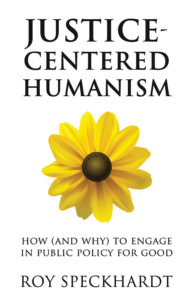Justice-Centered Humanism

BY ROY SPECKHARDT
PITCHSTONE PUBLISHING, 2021
As is true for so many nonfiction works, it’s the subtitle that’s pivotal in explaining what the title only suggests. In the end, Roy Speckhardt’s Justice-Centered Humanism is a “how-to” aimed not only to inform its readers how to promote humanist causes but, maybe more important still, inspire them to do so.
Not surprisingly, the author documents various reasons for taking an optimistic stance toward the many ethical dilemmas facing us today despite the discouraging material dominating the media, which insinuates that a single individual is powerless to affect public policy. Still, adopting a non-forward-looking, laissez-faire attitude only increases the likelihood of progressives being defeated by stubbornly regressive forces.
In short, if progressives are to be true to the spirit of humanism, simply standing by to see what happens next isn’t an option.
The fact that Speckhardt identifies as many as sixty elected officials today who identify with the non-theist community—comprised of humanists, atheists, agnostics, and free thinkers—also offers a rational basis for optimism. Note, too, that the political term progressive stems from the word progress. In the long term, odds would seem to favor fresh, innovative solutions to age-old problems. Speckhardt’s book (fact-based, unabashedly, as opposed to faith-based) explains how progressives can act independently, or with any number of humanist organizations, to further their goals.
 While it’s tempting to see Speckhardt’s forecasts about progressive individuals altering public policy as overly idealistic, the author does provide many examples of how such change has occurred due to well-planned and executed actions. There’s a certain irresistible power in truth which, if presented in just the right, non-offensive manner, can function to change minds and hearts. And for those remaining dubious about sticking their neck out in a political environment hostile to their objectives, Speckhardt documents how there are still opportunities to promote their agenda. He persuasively documents instances in which such ambitions have managed to succeed in very unfavorable climates.
While it’s tempting to see Speckhardt’s forecasts about progressive individuals altering public policy as overly idealistic, the author does provide many examples of how such change has occurred due to well-planned and executed actions. There’s a certain irresistible power in truth which, if presented in just the right, non-offensive manner, can function to change minds and hearts. And for those remaining dubious about sticking their neck out in a political environment hostile to their objectives, Speckhardt documents how there are still opportunities to promote their agenda. He persuasively documents instances in which such ambitions have managed to succeed in very unfavorable climates.
In his own words: “We shouldn’t automatically reject viable opportunities to work with oppositional White House administrations. By working with a coalition of progressives and conservatives on bipartisan issues, we can create worthwhile change where it’s needed…. As advocates, we have a responsibility to oppose regressive policies, but we also have an equal obligation to put our differences aside and work together when possible.”
Admittedly, the book isn’t an effortless read, because it’s not glib in its contentions. Rather, in its thoughtful, prescient design, it sheds vivid (and intriguing) new light on today’s most compelling issues. Consequently, it should hold the reader’s interest as it encourages them to return to, and study in-depth, those perplexing moral problems most closely bearing on their personal values.
Not really geared toward laid-back armchair philosophers, it nonetheless amply discusses humanism’s philosophical underpinnings. However, it’s much more a guidebook to address humanist-leaning individuals who may have pondered joining a non-theist organization to implement their humanistic ideals but hadn’t yet determined how to. Therefore, those more aspirational readers, wanting to be more involved in this progressive movement, will be richly rewarded by learning just what steps to take—and in what order—to be a vital part of making a difference in a world hungering for beneficial, widespread change.
Speckhardt’s book, anticipating the kinds of objections from people who in their political or religious leanings clearly veer right, explains how to find common ground with them, despite their theistic—vs. scientifically-supported—reasoning. Peaceful and friendly ways of approaching them have the potential to induce them to rethink conclusions they may unthinkingly have imbibed from their family or religious affiliation—and never seriously examined since then. For example, they may recognize how threatened the environment currently is and grasp that it’s not particularly responsible to leave it “all up to God” to fix it.
Plus, finding tenable ways to compromise with less like-minded persons or groups will minimize their resistance to working alongside you. Speckhardt is right on when he postulates that if progressives take a rigid, dogmatic position, their efforts to have others join them to foster mutually beneficial change will fail. True, the level of compromise and cooperation recommended isn’t anything our capitalist/competitive society would encourage, incessantly reminding us that we live in a dog-eat-dog world so should focus (Ayn Rand-like) on pursuing our self-interests unconcerned with how such a selfish orientation could harm others.
When Speckhardt centers on issues already blanketed by the media, he still manages to zero in on aspects that haven’t yet received adequate coverage. For example, his section on racial injustice accounts for the many unethical “norms” in discrimination against people of color more comprehensively than the majority of the public may be aware of. And the same is true of his writing on policy injustices regarding gender issues and LGBTQ+ rights, and ways to confront the climate crisis.
Also, blending the general with the specific, and the abstract with the concrete, Speckhardt provides numerous instances from his own life, such as his solo camping trip to Virginia’s Appalachian Trail in which he portrays a scene of natural beauty filling him with awe. And that “enlivens” his view that we need not transcend reality to be powerfully moved by the wonders of nature and realize how vital it is to prevent its desecration by opportunists ready to exploit it for personal gain. His book, generously interspersed with such personal examples, keeps it from running the risk of reading like some dry, dense, ultimately wearying treatise.
To conclude, at its root, humanism is about what’s humane, what exemplifies compassion. And its very essence is egalitarian, favoring not one person or tribe but all life on earth in how, universally, it promotes human and non-human welfare.
